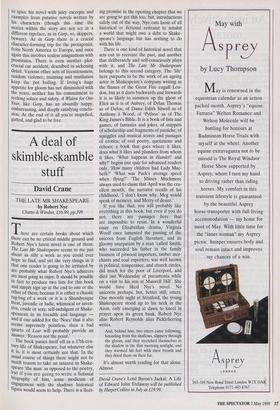A deal of skimble-skamble stuff
David Crane
THE LATE MR SHAKESPEARE by Robert Nye Chatto & Windus, £16.99, pp.399 There are certain books about which there can be no critical middle ground and Robert Nye's latest novel is one of them. The Late Mr Shakespeare seems to me just about as silly a work as you could ever hope to find, and yet the very things in it that one reader is going to be irritated by are probably what Robert Nye's admirers are most going to enjoy. It should be possible in fact to produce two lists for this book and simply sign up at the end to one or the other of them, because it is either a chaotic rag-bag of a work or it is a Shandyesque treat, juvenile or ludic, whimsical or inven- tive, crude or sexy, self-indulgent or Shake- spearean in its breadth and language and if one added for the 'Noes' that it also seems supremely pointless, then a bad quarto of Lear will probably provide an answer: 'Reason not the point.' The book passes itself off as a 17th-cen- tury life of Shakespeare, but whatever else A is, it is most certainly not that. In the Usual course of things there might not be much reason to take an interest in Shake- speare 'the man' as opposed to the poetry, but if you are going to write a fictional biography of him, some modicum of engagement with the shadowy historical figure would seem to help. There is a fleet- ing promise in the opening chapter that we are going to get this too, but, introductions safely out of the way, Nye cuts loose of all historical or fictional restraint to inhabit a world that might owe a debt to Shake- speare's language but has nothing to do with his life.
There is one kind of historical novel that sets out to recreate the past, and another that deliberately and self-consciously plays with it, and The Late Mr Shakespeare belongs to this second category. The 'life' here purports to be the work of an ageing actor in Shakespeare's company writing as the flames of the Great Fire engulf Lon- don, but as it darts backwards and forwards it is as likely to summon up the ghost of Eliot as it is of Aubrey, of Dylan Thomas as of Defoe, of Dame Edith Sitwell as of Anthony a Wood, of Python' as of The King James's Bible. It is a book of lists and games, of fantasies and jokes, of snippets of scholarship and fragments of pastiche; of squiggles and musical scores and passages of erotica; of real poetry, quotations and echoes; a book that goes where it likes, does what it likes and plunders from whom it likes. 'What happens in Hamlet? and why?' begins one quiz for advanced readers only. 'How many children had Lady Mac- beth?' What was Puck's average speed when flying?' The Misses Muchmore always used to claim that April was the cru- ellest month,' the narrator recalls of his childhood, 'I don't know why. Meg would speak of memory, and Merry of desire.'
If you like that, you will probably like everything in this book, but even if you do not, there are passages here that are impossible to resist. In a wonderful essay on Elizabethan drama, Virginia Woolf once lamented the passing of the unicorn from English literature, and its gloomy usurpation by a man 'called Smith, who succeeded his father in the family business of pitwood importers, timber mer- chants and coal exporters,,was well known in political, temperance, and church circles, did much for the poor of Liverpool, and died last Wednesday of pneumonia while on a visit to his son at Muswell Hill'. She would have liked Nye's novel. No unicorns perhaps, but, better still, otters. One moonlit night at Stratford, the young Shakespeare stood up to his neck in the Avon, only emerging at dawn to kneel in prayer upon its green bank, Robert Nye alias Robert Reynolds alias Pickleherring writes.
And, behind him, two otters came following, bounding from the shallows, slippery through the gloom, and they stretched themselves in the shadow in the thin morning sunlight, and they warmed his feet with their breath and they dried them on their fur.
It's almost worth reading for that alone. Almost.
David Crane's Lord Byron's Jackal: A Life of Edward John Trelawny will be published by HarperCollins in July at £19.99.


























































 Previous page
Previous page